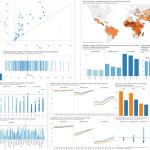Reposted from the Feed the Future Innovation Lab for Small-Scale Irrigation (ILSSI) website. Upcoming workshops in Ghana (April 13-14) and Tanzania (April 20-21) will carry forward this dialogue and forge new networks of government agents and practitioners working at the interface of gender and irrigation. If you work in these countries and would like more information >> Read more
Gettin’ GIF-fy With It: Using the WEAI and GIF to Mainstream Gender in Your Work
Have you heard of the Women’s Empowerment in Agriculture Index (more commonly referred to as the WEAI)? I’m sure many of you have not only heard of it, but have used it in your work: In 2015 alone, 13 Feed the Future partners used WEAI data to inform programming, and to date, close to 40 >> Read more
Making sense of land, statistics, and gender
Making sense of land, statistics, and gender (pdf) is a new infographic from the Gender and Land Rights database (GLRD) of the FAO and the CGIAR Research Program on Policies, Institutions, and Markets (PIM). The infographic explores the correct use of land ownership statistics (ownership understood in a broad sense beyond individual property rights) and highlights how gender >> Read more
Launch of new World Bank Gender Data Portal
The World Bank Group relaunched its popular Gender Data Portal, comprising current and historical data on topics ranging from health and education to jobs, assets, and political participation—all broken down by sex. The Bank Group is also launching its Little Data Book on Gender 2016 alongside new online tables—to be updated quarterly—linked to the latest World Development Indicators, making it easier than ever >> Read more
Best Practices and Lessons Learned for Supporting Women’s Land Rights
From 25 January to 5 February, the Land Portal Foundation will be holding a debate on the Global Land Tool Network’s Gender Evaluation Criteria (GEC), which were created to assess the effectiveness of land tools in supporting women’s land rights. The discussion will focus on sharing best practices and lessons learned for supporting women’s land rights. >> Read more
Empowerment matters: “Invisible Women” in Niger produce less food
Fleur Wouterse has a new blog published on Agrilinks discussing recent research using the WEAI in Niger. Her takeaway messages include: Empowerment matters for agricultural production. Less empowered households experience lower returns to their labor and use their traction equipment and animals in a less effective manner. Women are much less empowered in so-called dual households where >> Read more
Gender and Resilience Working Group Webinar Series
Please join us Thursday, January 14 at 10am EST for the next session of the Gender & Resilience Working Group Webinar Series. This webinar is part of a series being rolled out by the Gender & Resilience Working Group, which is led by Mercy Corp and Lutheran World Relief and involves many other organizations. The >> Read more
Gender Happy Hour Twitter Chat, January 14
Gender Happy Hour Twitter Chat: January 14th (8-9pm EST). Join this virtual happy hour on Twitter to talk about Gender, Men, and Masculinities. Let’s go beyond the engaging men discussion. What issues of masculinity are neglected in international development aid? Is there a risk of crossing a line between engaging men in gender equality and perpetuating patriarchy? >> Read more
Blogpost: Gender research beyond fairy tales: we can still do more and better
Isabel Lambrecht, Associate Research Fellow at IFPRI’s office in Ghana, writes about her choice to investigate gender in agricultural technology adoption. In this blogpost for Economics that Matters, she shares some surprises from what she has learned asking the question central to her dissertation, do we get higher uptake of agricultural technologies if agricultural extension programs work with >> Read more
New post from EnGendering Data
How sex-disaggregated land statistics can help monitor progress of the new Sustainable Development Goals For decades feminist economists and women’s rights advocates have made the case that the lack of data on women’s land rights has limited the ability to understand how this affects food security and rural poverty. However, recent developments may help us >> Read more
- « Previous Page
- 1
- …
- 6
- 7
- 8
- 9
- 10
- …
- 20
- Next Page »

